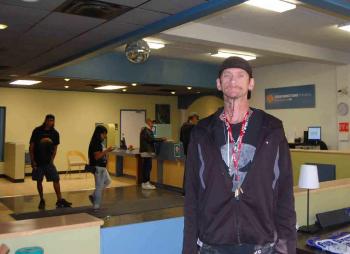Image Caption
By Shari Narine
Windspeaker Contributor
EDMONTON
Being able to deposit money in Four Directions Financial Services has made a difference in Bryan Kenny’s life.
“Before I had the bank account, I would go to a Money Mart and cash a cheque, and I’d have a whole pocket full of money. When you suffer from lifestyle barriers such as addictions, which I suffer from, having so much money in my pocket, it’s impulse buying. I’ll do this, I’ll do that,” said Kenny.
“With the bank account, I know my money is not on me… it makes it harder to spend my money, because I have to go to a bank machine. I have to do this, I have to do that.”
For the past year, Kenny has been depositing his money into his bank account at Four Directions Financial Services, a Boyle Street Community Services social enterprise set up in partnership with ATB Financial. Four Directions is the result of community consultations with inner-city agencies.
The bank is located in downtown Edmonton next door to the Boyle Street agency, where many of the bank’s clientele access other services and supports.
Kenny was one of the first customers at the bank, which held its official launch earlier this week.
To open his account, Kenny produced a single piece of identification – conventional banks require at least two pieces of ID – and then accessed the bank’s biometric identification technology.
In other words, he has security that people who live on the streets or who have high-risk lifestyles need.
If his backpack is stolen with his identification in it, he can still access his money as his retinal scan and fingerprints are on record at the bank and nobody else can gain access to his account.
The biometric feature has been used by 65 per cent of the bank’s 500 clients. Four Directions Financial Services is believed to be the only bank in Canada that is fully biometric.
The bank has also restored Kenny’s dignity.
“I didn’t feel labeled. Being in a society where I’ve got lifestyle barriers, whether it be addictions or homelessness, stuff like that, when you walk into a bank, especially downtown, if you’re not quote-unquote blue collar society, they look at you and say, ‘This guy is one of those people, let’s get him in, get him out.’ They treat you more like a statistic than a customer. This bank doesn’t do that. These people here know me on a first name basis and I them. It’s more like a bunch of friends,” he said.
The bank means clients can stay away from money lenders, the high fees of cheque cashing places, and the obstacles of cashing cheques at conventional financial institutions. It also means that when government-issued cheques are sent out, clients don’t have to walk around with all that money in their backpacks and be easy, predictable targets for street robbery.
Clients can set a daily limit on how much money they can withdraw, but Kenny hasn’t. He says he is not the best at budgeting, but he is trying.
“The ladies that work behind the desk are pretty friendly, pretty open. They’ll even suggest things for you. They care about us. They don’t just want our money. They want to see us save money or help me spend it properly,” he said.
Although he has money in his account, Kenny says right now his savings are a cushion for emergencies.
“I’m not one to think too far ahead. It’s one baby step at a time. Saving money is a good start. Once I have some, then I can think about things,” he said.
Robert Philp, director on the Boyle Street Community Services board, is hopeful that down the road the bank’s clientele will be able to start saving toward a goal.
“I think for many of them it will be a measure of success,” said Philp, a retired court judge, who also opened an account at Four Directions.
“I mean really what Boyle Street Community Services is really about is, in my view, partly about the restoration of dignity.”

